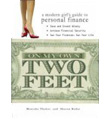Blog
Lawsuit seeks to break a deep freeze in credit.
Picture this nightmare financial scenario: You've taken out a $150,000 home-equity credit line to remodel your house, you've already pulled out thousands to pay contractors and owe thousands more, when suddenly you get a curt letter from the bank.
Effective yesterday, it says, we've shut down access to your credit line. Although we haven't physically appraised your property, an automated valuation indicates it is now worth significantly less than when we approved your application. If you wish to hire an appraiser, chosen by us but at your own expense, you can appeal our decision.
You're in shock. You can't pay bills you've already contracted for, you can't touch the money you confidently believed you had. Plus you know house prices in your area have been relatively stable since you took out the credit line. How could a bank effectively devalue your real estate using nothing more than a computer program?
Welcome to the world of what class-action attorneys estimate to be massive numbers of homeowners — 1 million customers at one national bank alone — who had their credit lines reduced, frozen or canceled without appraisals during 2009 in the tense months following the near-collapse of the capital marketplace.
Now a federal district court in Chicago has given the green light to clients of JP Morgan Chase Bank to proceed with a consolidated suit alleging their equity lines were yanked or reduced illegally, costing them billions of dollars in lost borrowing power. Judge Rebecca Pallmeyer rejected the bank's motion to dismiss the case, clearing the way for a possible giant class action.
The litigation pulls together eight separate suits seeking class certification filed by homeowners in California, Minnesota, Illinois, Texas, Arizona and Ohio. It is considered a bellwether test of the rights homeowners enjoy under the Truth in Lending Act and state consumer protection statutes when they take out equity lines of credit.
But it also shines light on the controversial computerized tools many lenders use to make quick, inexpensive assessments of property values in lieu of more costly professional appraisals. Suits on similar grounds are pending against other major lenders, including Wells Fargo, GMAC Mortgage and Citibank, according to attorneys.
The plaintiffs' lawyers not only are challenging JP Morgan Chase's legal right to rescind or limit credit lines without adequate documentation that property values have dropped "significantly" — as required by the truth in lending law — but are also mounting a side attack against automated valuation models (AVMs) that they claim are frequently inaccurate and unreliable.
Steven Lezell Woodrow, a partner with Edelson McGuire LLC, the Chicago law firm representing the plaintiffs, said in an interview that the computer valuations used by JP Morgan Chase were found to be "grossly in error," based on subsequent physical appraisals.
A spokesman for JP Morgan Chase, Tom Kelly, said the bank does not comment on ongoing litigation. However, the bank's filings in court argued that federal law does not specify the type of valuation technique lenders may use in reviewing equity line collateral, and that homeowners did not demonstrate the AVM values were incorrect.
The allegations in the consolidated suit include a credit line suspension on a house in Mountain View, Calif. Originally valued at $1 million and devalued to $826,000, a subsequent physical appraisal found that the house had actually increased in value to $1.07 million. The bank later reinstated the owner's credit line. On a house in Arlington, Texas, originally valued at $172,000, an AVM lowered that to $151,000. On appeal, the owner presented a physical appraisal completed 10 days before the bank's action that put its market value at $165,000. Nonetheless, the bank refused to reinstate the credit line, based on a revised requirement lowering maximum loan-to-value ratios on total debt to 70 percent from the previous 80 percent.
Though the litigation will be contested primarily on the grounds of alleged violations of truth-in-lending procedures and state consumer protection laws, the accuracy and use of automated valuations will be hovering in the background. Leaders in the AVM field such as Tim Grace, senior vice president of CoreLogic, say "commercial-grade AVMs have proven over decades of testing to provide accurate, independent and consistently reliable estimations of property value."
But lawyers for the homeowners say nothing should distract attention from the context surrounding JP Morgan Chase's mass freezing of credit lines shortly after accepting $25 billion in emergency liquidity funds from the Treasury, which the bank has since repaid.
"They took the government's money, which was supposed to help them to lend to people who needed credit," said Woodrow, "but instead they cut them back."
Write to Ken Harney at P.O. Box 15281, Chevy Chase, MD 20815 or via email at kenharney@earthlink.net.
Vote
You May Also Like...
- Time to Concede Home “Ownership” Is a Fraud.
- The Biweekly Mortgage Scam
- Making Home Affordable Program
- Help comes with a catch for subprime borrowers
- New rules to protect borrowers take effect on July 30








